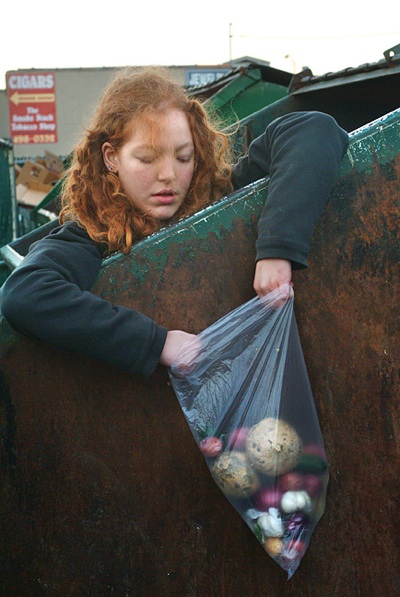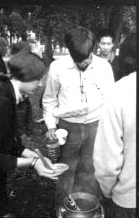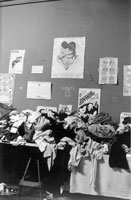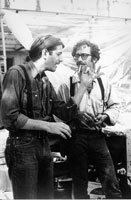Freeconomy
The free is a hot topic in the new economy. But there’s another dimension of the free economy. It’s a sub-set of the economy some call the “freeconomy.” The freeconomy primarily operates in meat-space. Here everything is free; money, especially profit, is verboten.
Dropping out of the monied economy has been a subversive act explored by each generation. Centuries ago in England, the Diggers preached “levelling” of the economy, and called themselves True Levellers. In American historical times, Henry David Thoreau inhabited the freeconomy all by himself in in the 1850s. Hippies settled in it en-mass in the 1960s. Starting about ten years ago, Burning Man pioneered a large-scale version of money-less existence for the digital generation. Burning Man’s capital of Black Rock City runs on the gift economy, essentially outlawing money — except for the hefty fee to enter it!
Three other new strands of the gift economy have appeared recently.
One is is the very active Freecycle community. Freecycle operates a web site where you can advertise (for free) an article or service available for free. They also use the “free” section of Craig’s List. Anyone, whether you are a greedy cheapskate, or a philosophical communitarian, or a radical no-work advocate, or free-believer — anyone can get stuff for free. Feels wonderful to find great working goods this way, and to give them away — rather than throw them away.
Then there are the Freegans. Sort of like vegans, freegans strive for a pure lifestyle that is easy on the earth. Of course they are green but freegans try to use only free things in all aspects of their life. Rather than just giving up buying retail, they support three activities that are familiar to me from my youth: voluntary joblessness (slacking), free transportation (hitchhiking), and waste reclamation (scrounging). To put it the way their website does:
Freeganism is a total boycott of an economic system where the profit motive has eclipsed ethical considerations and where massively complex systems of productions ensure that all the products we buy will have detrimental impacts most of which we may never even consider. Thus, instead of avoiding the purchase of products from one bad company only to support another, we avoid buying anything to the greatest degree we are able.
Freegans believe that housing is a RIGHT, not a privilege. Just as freegans consider it an atrocity for people to starve while food is thrown away, we are also outraged that people literally freeze to death on the streets while landlords and cities keep buildings boarded up and vacant because they can’t turn a profit on making them available as housing.
Unfortunately, freegans have become associated with a very lucrative free activity: dumpster diving. I know from personal experience you can find ALL KINDS of great stuff in dumpsters, but it’s sure not going to win you status points in ordinary social circles.

Most recently a new group has emerged on the “freescape.” It’s Freeconomy and they would like to eliminate or ignore money altogether. Not just capitalism, but moneyism.
I once thought the idea of a world without money was the most ridiculous and naive idea I had ever heard in my life. But I’ve been slowly ruminating on an article by Michael Golbhaber that I ran in Wired a decade ago. He proposed an economy that left money behind and ran on attention. At first it seems utopian, but I’ve come to regard it as a viable scenario for the future.
For some people, a money-less economy can’t come soon enough, but I don’t think they are ready (who is?) for the weirdness and unfairnesses an attention economy would bring. Mark Boyle, a former dot-com guy in the UK, plans to walk from Bristol UK to the birthplace of Ghandi in India — without using or even handling money along the way. He intends to basically panhandle across several continent — but he’s added an extra challenge in that he won’t accept spare change. He wants food, shelter and rides.
According to Treehugger, Boyle says: “My interest started five or six years ago when I was studying economics,” says Boyle. “The more we accumulate wealth, the more it leads to a breakdown of community.”
Boyle, who has just started the trek in January, 2008, hopes he can use his message of peace, equality, and fairness to persuade others, particularly those without very much, to give him sustenance in exchange for his message. He’s not the first person to walk without money. Peace Pilgrim spent 28 years crisscrossing the US seven times on foot, without money, relying on the gifts of strangers, in an effort to bring peace.
Boyles greatest challenge in trying to import the gift economy to places like India, where begging is rampant, is to convince people he is a freeconomist, as he likes to call himself, and not a freeloader.
When considering the free economy, I think it is important to understand that the free — the gift economy, the open source movement, and the digital flow of free copies — is not an panacea to the ills of capitalism. Although there are many wonderful things about, it is not perfect, and posses much that needs to be counterbalanced in other ways.
An anonymous pamphleteer from the modern-day Digger commune in San Francisco, a player in the active gift economy that sprung up in California in the late 1960s and ’70s, pointed out some keen insights into the nature of the freeconomy in a funky newspaper handed out for free in 1978.



Free is not the end-in-all of the universe– just a humble handy practice to set some things in it straight. It never really caught on except in Surrey and San Francisco, and for all I know may need a highly specialized environment to thrive. There are dozens of other remedies, of equal potency, for the world’s various ills, and each remedy has its advantages and drawbacks. Use free where applicable. It would be a mistake to stick to it rigidly in a situation or place where it wouldn’t work or be comprehended, just as it would be a mistake not to try it out, because of preconceptions about its practicality. For example, a free soup kitchen in Tangiers would probably get all the local soup kitchen proprietors upset and you busted. However a cheap soup kitchen that subtly lost money could probably fly. You can never ignore the local ecology, on the contrary, you have to know it well. You have to know what you can get away with and what strategy will be most effective, to right the wrongs you want to right.
The social justice aspect of the free is a part of the free movement, but only a part. The larger point is that in any economy the free will always only be one option. It is a tool. All tools must find their appropriate place and time. Free in the digital world is always just one path, and it must be wielded and managed in the context of other options.


